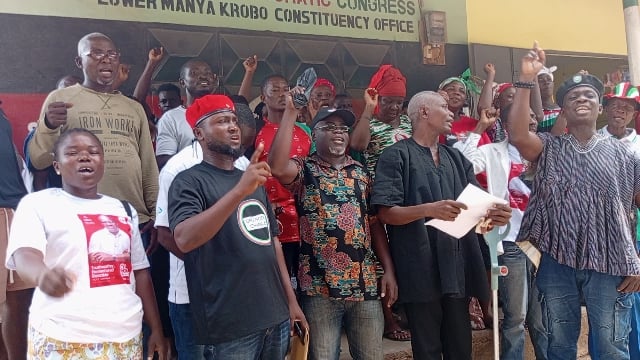The simmering discontent within the Lower Manya Krobo Constituency of the National Democratic Congress (NDC) has reached a boiling point, ignited by the nomination of Mr. John Atter Matey as the Municipal Chief Executive (MCE). A coalition of grassroots members, the bedrock of the party’s support in the region, has publicly denounced the nomination, characterizing it as a betrayal of trust and a blatant disregard for the dedicated service of long-standing party loyalists. Their grievances, articulated in a strongly worded press statement, paint a picture of a nominee perceived as divisive, arrogant, and lacking the fundamental qualities of leadership required to effectively govern the municipality. This grassroots rebellion underscores the deep-seated tensions within the NDC and raises concerns about the party’s internal processes and decision-making, particularly regarding appointments to key positions.
At the heart of the controversy lies the perceived injustice of overlooking qualified and devoted party members in favor of Mr. Matey, a candidate whom the grassroots members allege lacks the necessary experience, competence, and moral standing. The group’s statement details a litany of accusations against the nominee, including financial impropriety, specifically the alleged misappropriation of a GHC 50,000 donation intended for party activities during the previous primaries. Further allegations involve the hoarding of fertilizers meant for local farmers, suggesting a disregard for the welfare of the constituency’s agricultural community. These accusations of mismanagement and lack of transparency in handling party resources cast a shadow over Mr. Matey’s suitability for the position, according to the aggrieved members.
Adding fuel to the fire is the allegation that Mr. Matey manipulated the appointment process by involving close family members, raising concerns about nepotism and undermining the fairness and integrity of the selection procedure. The grassroots members claim that this perceived manipulation further marginalized deserving candidates who had dedicated years of service to the party. This perceived disregard for established party protocols and the contributions of loyal members has fueled resentment and a sense of disenfranchisement among the grassroots, threatening the unity and stability of the NDC within the constituency.
The grassroots coalition asserts that the nomination of Mr. Matey represents a dangerous precedent, signaling that loyalty, humility, and competence are no longer valued within the party’s hierarchy. They argue that this decision not only disrespects dedicated party members but also undermines the very foundation upon which the NDC is built. The group warns that if their concerns are ignored, the resulting unrest could have far-reaching consequences for the party’s future prospects in the Lower Manya Krobo Constituency. The implications extend beyond internal party dynamics, as the perceived lack of transparency and accountability in the appointment process could erode public trust in the NDC’s ability to govern effectively.
In a direct appeal to the highest echelons of power within the NDC, the grassroots members have called upon the President and the Office of the Chief of Staff to intervene and rectify what they consider a grave error in judgment. Their plea underscores the urgency of the situation and the potential for escalating tensions within the party if their demands are not met. They emphasize that their protest is not driven by personal animosity towards Mr. Matey but rather by a commitment to upholding the principles of justice, loyalty, and competence within the NDC. The future of the party in Lower Manya Krobo, they argue, hinges on the leadership’s willingness to address their concerns and restore trust among the grassroots members.
The grassroots members’ ultimatum – that peace within the constituency is at risk if their demands are ignored – serves as a stark warning to the NDC leadership. The situation in Lower Manya Krobo represents a microcosm of the challenges facing the party as it navigates internal divisions and strives to maintain a cohesive front. The leadership’s response to this crisis will be closely scrutinized, not only by party members but also by the wider public, as it will demonstrate the NDC’s commitment to internal democracy, accountability, and responsiveness to the concerns of its grassroots base. The future of the NDC in Lower Manya Krobo, and perhaps beyond, may well depend on the party’s ability to address this brewing crisis effectively and restore faith among its disillusioned members.














